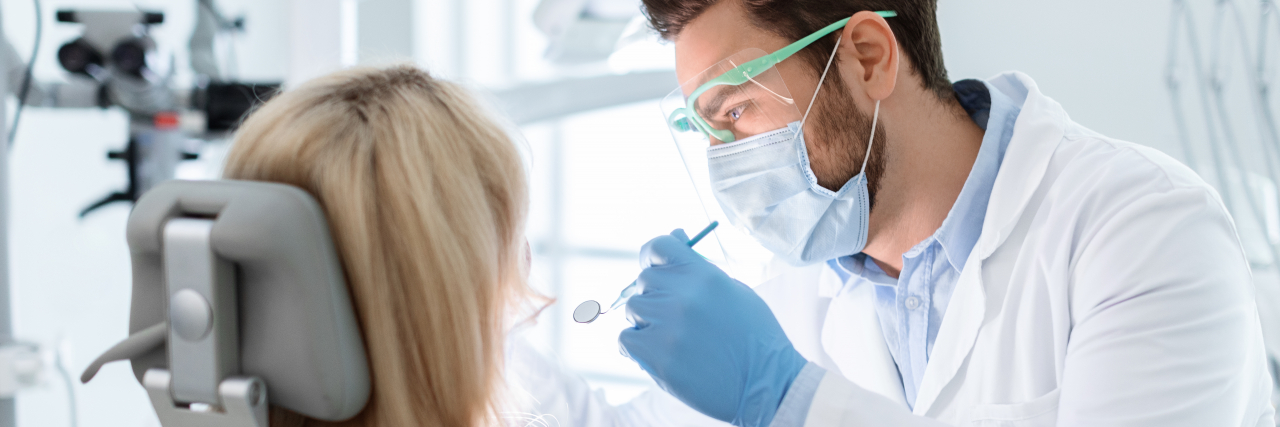When my sister and I were children, my mother would put fluoride in our milk every morning, made sure we brushed our teeth twice a day, and took us for regular dental checkups and cleaning. Throughout my teens and adulthood, I remained diligent about my dental health, and aside from rebuilding a broken front tooth and two years of braces, had no dental work whatsoever. Not a single cavity in 40 years (which, apparently, is very unusual). But that all drastically changed in my 40s.
In 2009, as a result of a rare neurological autoimmune illness, I was hospitalized and mostly bed-confined for 18 months. During my hospitalization, I received no oral health care that I can remember. When my mouth was dry, I was allowed to suck on a small, moistened sponge on a stick. Much later, I was permitted to chew ice chips, and suck the resulting water from my mouth with my suction wand. Near the end, after I had the tracheostomy removed, I relearned how to swallow and was finally able to eat and drink by mouth again. Never once, in the year and a half I was hospitalized, was my mouth cleaned or my teeth brushed. My oral health was completely overlooked. Under the circumstances, I imagine it was probably the last thing anyone was thinking about, including myself. But I wish it had been included in my daily care. It would have saved me a whole lot of discomfort, time, and money in the future.
Some time after I left the hospital, I was finally able to see a dentist for a cleaning and check-up. The cleaning took an extraordinarily long time, and I grew more uncomfortable with each passing minute. I struggled to hold my mouth open and body still as the hygienist scraped and polished away years of plaque and tartar build-up. Afterward, the dentist looked at the x-rays and examined my teeth, then delivered the news: I required five fillings, and was going to need a root canal in one of my molars. For someone who had never had a cavity, this was quite a shock. I went ahead and booked the appointments to have the work done, and began following all the dentist’s recommendations to prevent further dental issues. Little did I know that this was only the first of many more issues to come.
As the years marched on, despite my best efforts to maintain excellent oral hygiene, my teeth continued to deteriorate. I spent several years returning again and again to the dentist’s chair, wading through the red tape of funding, and often draining my already meager bank account. Today, I have 15 fillings, five root canals, five crowns, one implant, and I’m still waiting for funding approval for two more crowns. My husband’s dental insurance is pretty good, and the Ministry covers up to a certain amount per year. However, dental work is expensive, and many procedures (like crowns) are not fully covered, and some are not covered at all (like implants).
So why did this happen? Tooth decay isn’t often noticeable right away. It can take some time before it is identified, and an improvement in oral care can prevent further decay, but does not reverse the damage that has begun. This is why I kept returning to the dentist for years after I left the hospital.
There are many reasons for dental health issues, but the three main reasons people who have been hospitalized for an extended time develop tooth decay are dry mouth, inadequate cleaning, and medications.
Dry mouth:
The number one reason why long-term hospital patients develop dental issues is dry mouth. There are multiple reasons why a patient develops dry mouth, including ventilation, open-mouth breathing, brain injury, and disease. Saliva is an important component of oral health. Saliva provides a natural defense against acid erosion by neutralizing acids within the mouth, washing away food debris, and restoring minerals to the teeth. Decreased saliva production often leads to tooth decay and gum disease.
Inadequate cleaning:
When a patient is in the ICU and medical staff are fighting to keep them alive, oral health care is the lowest concern on the priority list. Issues such as lack of consciousness, intubation, ventilation, seizures, etc. prevent oral care from being performed. But even when the patient stabilizes and begins to recover, oral care is often overlooked. It is simply not included in the procedure that nurses and hospital aides follow in caring for patients. It wasn’t until I left the hospital and entered rehab that dental hygiene became part of my daily routine again.
Medication:
Some medications may have a direct impact on dental health by causing inflammation, infection, enamel erosion, or bone problems. Many medications, however, impact dental health indirectly through the side effect of dry mouth which, as I explained earlier, is a common cause of tooth decay.
The fact that dental care is separate from health care is a mystery to me. Our mouths are a part of our body, and our oral health can impact our physical health. Gum disease is linked to a host of illnesses including heart disease, diabetes, respiratory disease, osteoporosis, and rheumatoid arthritis. Here in Canada, the importance of dental health and its link to overall wellness is becoming recognized, and there is a push for universal dental care. Until that happens, if you have a loved one in medical care, make sure oral hygiene is a part of their regular routine. They (and their wallets) will thank you!
Getty image by Prostock Studio.

